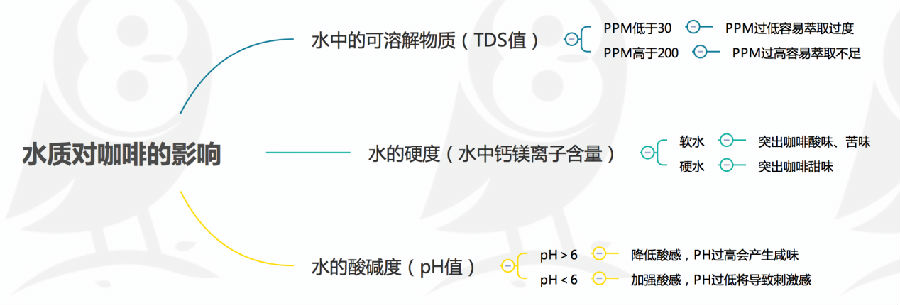Why does coffee have such a high demand for water? How will water affect the quality of coffee?

For professional baristas, please follow the coffee workshop (Wechat official account cafe_style)
Why does coffee have such a high demand for water? For coffee, water is an important substance second only to coffee beans. The content of water in a cup of coffee is more than 98%, so the difference of water directly determines the quality, flavor and taste of a cup of coffee.
Water, there are mountain spring water, sea water, lake water, river water, tap water, as well as all kinds of pure water, mineral water. So how does water affect the quality of coffee when making coffee?
The test found that water affects coffee from three angles:
(1) soluble substances in water (TDS value)
(2) pH of water (PH value)
(3) hardness of water (content of calcium and magnesium ions in water)
Effect of water quality on coffee-TDs value:
TDS, total dissolved solids (Total dissolved solids, abbreviated TDS), also known as total dissolved solids, is measured in milligrams per liter (mg/L). It indicates how many milligrams of dissolved solids are dissolved in 1 liter of water. The higher the TDS value, the more dissolved matter the water contains.
The water with different TDS values (unit ppm) is evaluated, and it is concluded that coffee will be more easily over-extracted if the TDS value of water ppm is lower than 30, while coffee is more likely to be underextracted when the ppm is higher than 200.
After TDS evaluation, the TDS value of Nongfu Spring natural water is 49ppm, which is not easy to over-extract and insufficient to extract coffee, and the sour, bitter and fruity taste of coffee can be properly expressed.
Effect of water quality on coffee-hardness of water:
The higher concentration of calcium and magnesium ions in water is called hard water, while the lower concentration is called soft water. The water in northern China is generally hard, while the water in the south is generally soft. Soft water makes coffee more fully extracted, the sour and bitter taste of coffee will be more easily highlighted, while hard water contains higher concentration of minerals, although the sour and bitter flavor of coffee is not so prominent, it is improved in sweetness. and add points at the mineral level that is beneficial to the human body.
Generally speaking, water with too much or too little minerals is considered to be unbalanced water quality. Thanks to the direct absorption and encapsulation from the water source, the mountain spring water contains the right amount of minerals, giving the coffee the best balance in flavor, softness and nutrition. It can effectively prevent cardiovascular disease, metabolic syndrome, neurodegeneration and other diseases, which is very beneficial to human health.
Effect of water quality on coffee-pH value:
Acidity and alkalinity describes the degree of acidity and basicity of aqueous solution, expressed by pH value. Under the standard condition, the aqueous solution with pH = 7 is neutral and pH7 is alkaline. Coffee with a slightly sour taste, with a pH value of between 5 and 6, is a weakly acidic drink.
If you use water with a PH value of more than 6 to brew coffee, it will increase the pH value of coffee, reduce the acidity of coffee, soften the taste and tend to the balance of coffee.
Important Notice :
前街咖啡 FrontStreet Coffee has moved to new addredd:
FrontStreet Coffee Address: 315,Donghua East Road,GuangZhou
Tel:020 38364473
- Prev

How to adjust the Italian bean grinder and how to check the change of the Italian bean mill
Professional barista communication Please pay attention to the coffee workshop (Wechat official account cafe_style) Caf é to adjust the grinding degree every day, some even once in a few hours, if there is a strict requirement for the extraction results, it should be adjusted again every 5 hours, because beans are changing at every moment, and even air pressure, temperature and humidity will have an impact on the extraction.
- Next
The key to good coffee how to determine the thickness of ground coffee
Professional barista communication Please pay attention to the coffee workshop (Wechat official account cafe_style) the fineness of the coffee workshop (official account Coffee) is the best way to control the bitterness, because the finer the grinding, the higher the extraction rate, the easier it is to extract high molecular weight astringent bitter products such as chlorogenic acid, quinic acid, caffeine and carbides. On the contrary, if the grinding is too rough, the lower the extraction rate is, the more difficult it is to extract high molecular weight astringent bitterness, but the middle molecular weight is sweet.
Related
- Beginners will see the "Coffee pull flower" guide!
- What is the difference between ice blog purified milk and ordinary milk coffee?
- Why is the Philippines the largest producer of crops in Liberia?
- For coffee extraction, should the fine powder be retained?
- How does extracted espresso fill pressed powder? How much strength does it take to press the powder?
- How to make jasmine cold extract coffee? Is the jasmine + latte good?
- Will this little toy really make the coffee taste better? How does Lily Drip affect coffee extraction?
- Will the action of slapping the filter cup also affect coffee extraction?
- What's the difference between powder-to-water ratio and powder-to-liquid ratio?
- What is the Ethiopian local species? What does it have to do with Heirloom native species?

